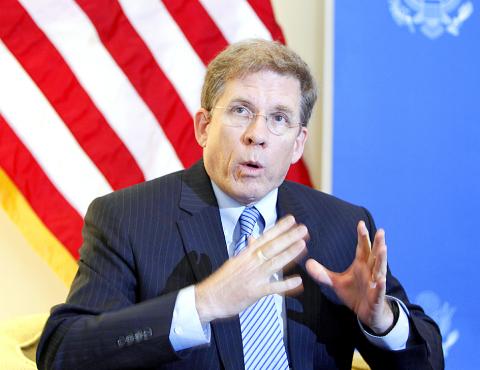A top US diplomat for Southeast Asia yesterday urged Pacific island nations not to withdraw diplomatic recognition of Taiwan, warning that Chinese pressure to change Taiwan’s international standing threatens to increase the possibility of conflict.
US Principal Deputy Assistant Secretary of State for East Asian and Pacific Affairs W. Patrick Murphy spoke to reporters in Canberra at the end of a three-day visit to Australia for talks with government officials on expanding their security alliance.
Six Pacific island nations have diplomatic relations with Taiwan, accounting for one-third of the nation’s diplomatic allies around the world, but they are under intensifying pressure from Beijing to switch allegiance as it builds its influence in the region.

Photo: AP
Murphy said that diplomatic decisions should not be influenced by China.
“China is attempting to reduce Taiwan’s diplomatic relations in the region and that’s kind of heavy-handed,” Murphy said. “It gives rise to tensions by changing the ‘status quo’ and then the possibility of conflict.”
Then-Solomon Islands prime minister Rick Hou had promised to review the nation’s relations with Taiwan before he lost power in last month’s elections.
Switching recognition to China, the Solomon Islands’ biggest export market, remains a live issue.
Murphy said that the US has “strong diplomatic relations” with the Solomon Islands and had congratulated newly elected Solomon Islands Prime Minister Manasseh Sogavare.
Murphy declined to say whether he discussed with Australian officials concerns of some security analysts that China wants to construct a deep-water military base somewhere in the Pacific.
Chinese militarization in the Pacific would be as destabilizing as its militarization of disputed islands in the South China Sea, he said.
“A growing military presence anywhere in the region of a country like China that doesn’t work on a rules-based approach or adhere to international standards is and should be of concern,” Murphy said. “We have a lot of national interests in the region that are built on freedoms of commerce, navigation and overflight. We have key partners and the establishment of a military presence there, the notion, the concept, is indeed quite troubling.”
Murphy today is due to fly to Australia’s nearest neighbor, Papua New Guinea, where pro-Beijing Papua New Guinean Prime Minister Peter O’Neill backs China’s territorial claims in the South China Sea.
The US and Australia have committed to redevelop a naval base on Manus Island.
Murphy said that the Lombrum Naval Base expansion was about a “partnership with Papua New Guinea and meeting its needs,” not denying China a military presence in the nation of more than 8 million people.
When Australia and Papua New Guinea announced the upgrade in October last year, China cautioned both nations to discard “Cold War” thinking, referring to an era when the world was less integrated.
“The Pacific island countries should not be the sphere of influence of any country,” Chinese Ministry of Foreign Affairs spokesman Lu Kang (陸慷) said at the time.

Tropical Storm Gaemi strengthened into a typhoon at 2pm yesterday, and could make landfall in Yilan County tomorrow, the Central Weather Administration (CWA) said yesterday. The agency was scheduled to issue a sea warning at 11:30pm yesterday, and could issue a land warning later today. Gaemi was moving north-northwest at 4kph, carrying maximum sustained winds near its center of up to 118.8kph and gusts of 154.8kph. The circumference is forecast to reach eastern Taiwan tomorrow morning, with the center making landfall in Yilan County later that night before departing from the north coast, CWA weather forecaster Kuan Shin-ping (官欣平) said yesterday. Uncertainty remains and

SEA WARNING LIKELY: The storm, named Gaemi, could become a moderate typhoon on Wednesday or Thursday, with the Taipei City Government preparing for flooding A tropical depression east of the Philippines developed into a tropical storm named Gaemi at 2pm yesterday, and was moving toward eastern Taiwan, the Central Weather Administration (CWA) said. Gaemi could begin to affect Taiwan proper on Tuesday, lasting until Friday, and could develop into a moderate typhoon on Wednesday or Thursday, it said. A sea warning for Gaemi could be issued as early as Tuesday morning, it added. Gaemi, the third tropical storm in the Pacific Ocean this typhoon season, is projected to begin moving northwest today, and be closest to Taiwan on Wednesday or Thursday, the agency said. Today, there would likely

DISRUPTIONS: The high-speed rail is to operate as normal, while several airlines either canceled flights or announced early departures or late arrivals Schools and offices in 15 cities and counties are to be closed today due to Typhoon Gaemi, local governments announced last night. The 15 are: Taipei, New Taipei City, Taoyuan, Tainan, Keelung, Hsinchu and Kaohsiung, as well as Yilan, Hualien, Hsinchu, Miaoli, Chiayi, Pingtung, Penghu and Lienchiang counties. People should brace for torrential rainfall brought by the storm, with its center forecast to make landfall on the east coast between tonight and tomorrow morning, the Central Weather Administration (CWA) said. The agency issued a sea warning for the typhoon at 11:30pm on Monday, followed by a land warning at 11:30am yesterday. As of

CASUALTY: A 70-year-old woman was killed by a falling tree in Kaohsiung as the premier warned all government agencies to remain on high alert for the next 24 hours Schools and offices nationwide are to be closed for a second day today as Typhoon Gaemi crosses over the nation, bringing torrential rain and whipping winds. Gaemi was forecast to make landfall late last night. From Tuesday night, its outer band brought substantial rainfall and strong winds to the nation. As of 6:15pm last night, the typhoon’s center was 20km southeast of Hualien County, Central Weather Administration (CWA) data showed. It was moving at 19kph and had a radius of 250km. As of 3pm yesterday, one woman had died, while 58 people were injured, the Central Emergency Operation Center said. The 70-year-old